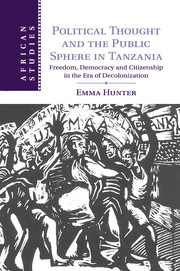 Political Thought and the Public Sphere in Tanzania
Political Thought and the Public Sphere in Tanzania Book contents
- Political Thought and the Public Sphere in Tanzania
- Series page
- Political Thought and the Public Sphere in Tanzania
- Copyright page
- Contents
- Book part
- Map of Tanzania
- Glossary
- Introduction
- 1 Concepts of Progress in Mid-Twentieth-Century Tanzania
- 2 Transnational Languages of Democracy after 1945
- 3 Representation, Imperial Citizenship and the Political Subject in Late Colonial Tanganyika
- 4 Patriotic Citizenship and the Case of the Kilimanjaro Chagga Citizens Union
- 5 Freedom in Translation
- 6 Languages of Democracy on Kilimanjaro and the Fall of Marealle
- 7 ‘One-Party Democracy’
- 8 Ujamaa and the Arusha Declaration
- Conclusion
- References
- Index
- Books in this Series
- References
References
Published online by Cambridge University Press: 05 May 2015
- Political Thought and the Public Sphere in Tanzania
- Series page
- Political Thought and the Public Sphere in Tanzania
- Copyright page
- Contents
- Book part
- Map of Tanzania
- Glossary
- Introduction
- 1 Concepts of Progress in Mid-Twentieth-Century Tanzania
- 2 Transnational Languages of Democracy after 1945
- 3 Representation, Imperial Citizenship and the Political Subject in Late Colonial Tanganyika
- 4 Patriotic Citizenship and the Case of the Kilimanjaro Chagga Citizens Union
- 5 Freedom in Translation
- 6 Languages of Democracy on Kilimanjaro and the Fall of Marealle
- 7 ‘One-Party Democracy’
- 8 Ujamaa and the Arusha Declaration
- Conclusion
- References
- Index
- Books in this Series
- References
- Type
- Chapter
- Information
- Political Thought and the Public Sphere in TanzaniaFreedom, Democracy and Citizenship in the Era of Decolonization, pp. 237 - 254Publisher: Cambridge University PressPrint publication year: 2015


